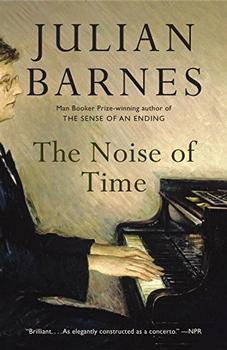Summary | Excerpt | Reading Guide | Reviews | Beyond the Book | Readalikes | Genres & Themes | Author Bio

Critics' Opinion:
Readers' Opinion:
First Published:
May 2016, 224 pages
Paperback:
Jun 2017, 224 pages
 Book Reviewed by:
Book Reviewed by:
Donna Chavez
Buy This Book
Excerpt
The Noise of Time
And so, it had all begun, very precisely, on the morning of the 28th of January 1936, in Arkhangelsk. He had been invited to perform his first piano concerto with the local orchestra under Viktor Kubatsky; the two of them had also played his new cello sonata. It had gone well. The next morning he went to the railway station to buy a copy of Pravda. He had looked at the front page briefly, then turned to the next two. It was, as he would later put it, the most memorable day of his life. And a date he chose to mark each year until his death.
Except that—as his mind obstinately argued back—nothing ever begins as precisely as that. It began in different places, and in different minds. The true starting point might have been his own fame. Or his opera. Or it might have been Stalin, who, being infallible, was therefore responsible for everything. Or it could have been caused by something as simple as the layout of an orchestra. Indeed, that might finally be the best way of looking at it: a composer first denounced and humiliated, later arrested and shot, all because of the layout of an orchestra.
If it all began elsewhere, and in the minds of others, then perhaps he could blame Shakespeare, for having written Macbeth. Or Leskov for Russifying it into Lady Macbeth of Mtsensk. No, none of that. It was, self-evidently, his own fault for having written the piece that offended. It was his opera's fault for being such a success—at home and abroad—it had aroused the curiosity of the Kremlin. It was Stalin's fault because he would have inspired and approved the Pravda editorial—perhaps even written it himself: there were enough grammatical errors to suggest the pen of one whose mistakes could never be corrected. It was also Stalin's fault for imagining himself a patron and connoisseur of the arts in the first place. He was known never to miss a performance of Boris Godunov at the Bolshoi. He was almost as keen on Prince Igor and Rimsky-Korsakov's Sadko. Why should Stalin not want to hear this acclaimed new opera, Lady Macbeth of Mtsensk?
And so, the composer was instructed to attend a performance of his own work on the 26th of January 1936. Comrade Stalin would be there; also Comrades Molotov, Mikoyan and Zhdanov. They took their places in the government box. Which had the misfortune to be situated immediately above the percussion and the brass. Sections which in Lady Macbeth of Mtsensk were not scored to behave in a modest and self-effacing fashion.
He remembered looking across from the director's box, where he was seated, to the government box. Stalin was hidden behind a small curtain, an absent presence to whom the other distinguished comrades would sycophantically turn, knowing that they were themselves observed. Given the occasion, both conductor and orchestra were understandably nervous. In the entr'acte before Katerina's wedding, the woodwind and brass suddenly took it upon themselves to play more loudly than he had scored. And then it was like a virus spreading through each section. If the conductor noticed, he was powerless. Louder and louder the orchestra became; and every time the percussion and brass roared fortissimo beneath them—loud enough to knock out windowpanes—Comrades Mikoyan and Zhdanov would shudder theatrically, turn to the figure behind the curtain and make some mocking remark. When the audience looked up to the government box at the start of the fourth act, they saw that it had been vacated.
After the performance, he had collected his briefcase and gone straight to the Northern Station to catch the train for Arkhangelsk. He remembered thinking that the government box had been specially reinforced with steel plates, to protect its occupants against assassination. But that there was no such cladding to the director's box. He was not yet thirty, and his wife was five months pregnant at the time.
Excerpted from The Noise of Time by Julian Barnes. Copyright © 2016 by Julian Barnes. All rights reserved. No part of this excerpt may be reproduced or reprinted without permission in writing from the publisher.





The Flower Sisters
by Michelle Collins Anderson
From the new Fannie Flagg of the Ozarks, a richly-woven story of family, forgiveness, and reinvention.

The House on Biscayne Bay
by Chanel Cleeton
As death stalks a gothic mansion in Miami, the lives of two women intertwine as the past and present collide.

The Funeral Cryer by Wenyan Lu
Debut novelist Wenyan Lu brings us this witty yet profound story about one woman's midlife reawakening in contemporary rural China.
Your guide toexceptional books
BookBrowse seeks out and recommends the best in contemporary fiction and nonfiction—books that not only engage and entertain but also deepen our understanding of ourselves and the world around us.